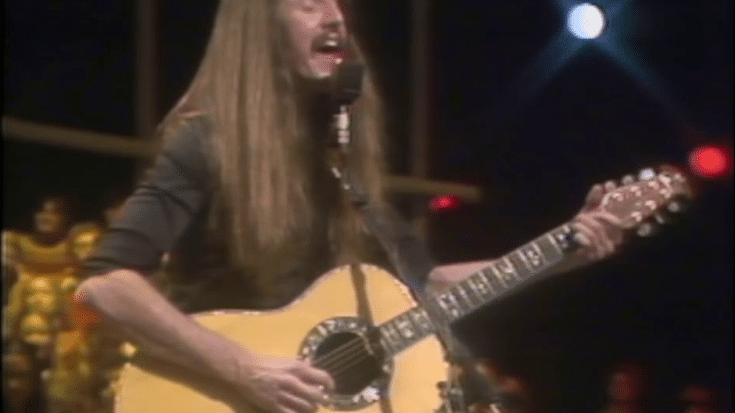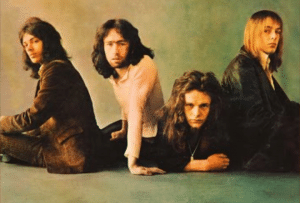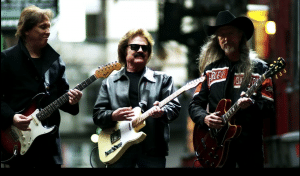9 Classic Rock Songs That Unexpectedly Became Hits

via The Doobie Brothers / YouTube
Sometimes, the hidden treasures of an album lie not on the flashy A-side but tucked away on the B-side, where less attention is typically given. However, occasionally a B-side track emerges from the shadows, capturing the public’s affection and climbing the charts to stand out as an unexpected hit. Here are some classic examples of B-side songs that defied expectations and became notable hits.
“Beth,” Kiss (1976)
Initially brushed aside by Kiss and tucked away on the B-side of a third single, “Beth” unexpectedly stole the spotlight thanks to the admiration of Rosalie Trombley’s daughter, a music director. Trombley decided to play it on her rock station in Ontario, which catapulted the sentimental ballad to immense popularity. Surprisingly, it soared to become the highest-charting single in the band’s career. The song’s success was not only a triumph but also a touching story, highlighted by a special gold record presentation to Trombley’s daughter, acknowledging her indirect role in the song’s unexpected rise.
“Black Water,” Doobie Brothers (1974)
Before a radio DJ from Roanoke, Virginia chose to play the song—inspired by the neighboring Blackwater River—”Black Water” was all but forgotten. The song quickly became popular nationwide after receiving local radio, which propelled it to the top of the charts and became the Doobie Brothers’ first number one hit. This unplanned rise to popularity was evidence of the erratic path taken by popular songs, showing that occasionally a song that was overlooked by the public might become a huge hit years after it was first released.
“Colour My World,” Chicago (1970)
Originally overshadowed in the vast array of Chicago’s music, “Colour My World” eventually found its niche and blossomed as a beloved slow-dance anthem. Its rise in popularity led to a re-release coupled with “Beginnings,” propelling it to number seven on the charts. After the tragic death of band member Terry Kath, his bandmates continued to honor the song’s significance in their live performances, maintaining its legacy as a timeless piece that could evoke deep emotions and cherished memories.
“God Only Knows,” Beach Boys (1966)
“God Only Knows” was hailed as an A-side in the UK and outperformed its sibling track “Wouldn’t It Be Nice?” in the US despite being relegated to the B-side due to its potentially controversial title. Its inventive composition and emotional depth struck a deeper chord. The song, which has received widespread praise, is proof that genuine musical talent can overcome early doubts and find resonance with listeners all across the world, ultimately cementing its status as a classic in American pop music history.
“Hey Tonight,” Creedence Clearwater Revival (1971)
“Hey Tonight” offered a glimpse of success for Creedence Clearwater Revival during a tumultuous time as the band faced imminent separation. While it achieved international acclaim and topped charts in places like Denmark and Germany, it was a poignant reminder of the band’s fracturing relationships. This B-side hit marked one of the last few times the band would share in the joy of a top-10 hit, signaling the end of an era just before the release of their final album, “Mardi Gras.”
“I Am the Walrus,” Beatles (1967)
The Beatles were known for their innovative approach to music, often pairing contrasting styles on the same record. “I Am the Walrus,” the avant-garde creation of John Lennon, found its way onto the B-side of “Hello, Goodbye,” which was a more traditional pop song by Paul McCartney. Despite its secondary status on the record, “I Am the Walrus” captivated listeners with its enigmatic lyrics and bold orchestration. The song’s blend of psychedelic rock and classical music elements helped cement it as a standout track that has long overshadowed the A-side, proving that Lennon’s boundary-pushing artistry had a lasting impact on music and culture.
“Ruby Tuesday,” Rolling Stones (1967)
The Rolling Stones mastered the art of creating songs that captured the zeitgeist of their era, and “Ruby Tuesday” was no exception. As the B-side to the more provocative “Let’s Spend the Night Together,” “Ruby Tuesday” managed to avoid the censorship challenges faced by its A-side, especially on platforms like ‘The Ed Sullivan Show.’ With its melodic charm and haunting lyrics, “Ruby Tuesday” resonated with a wider audience, eventually outshining its counterpart and earning the group their fourth number one hit in the United States. The song’s success is a classic example of how sometimes the flip side of a record can surprise everyone and emerge as the true hit.
“Silver Springs,” Fleetwood Mac (1977)
“Silver Springs” was a track marked by its exclusion from Fleetwood Mac’s landmark album ‘Rumours,’ instead being relegated to the B-side of “Go Your Own Way.” Stevie Nicks, the song’s author, performed it with a poignant sense of loss and yearning, mirroring the internal tensions within the band at the time. Years later, during the band’s reunion for ‘The Dance,’ Nicks reintroduced “Silver Springs” with a passionate performance that reignited interest in the song. The track ultimately achieved a Top 5 spot on the adult contemporary chart and was acknowledged by the Grammys, securing its redemption as a signature Fleetwood Mac song that almost got away.
“We Will Rock You,” Queen (1977)
Queen’s stomping anthem “We Will Rock You” was originally released as a double A-sided single along with “We Are the Champions,” offering fans a powerful one-two punch. While both songs were fixtures at sporting events and gatherings worldwide, “We Will Rock You” embarked on its own journey back up the charts decades later following the release of the biopic ‘Bohemian Rhapsody’ in 2018. The enduring popularity of its simple, yet infectious beat and chant, coupled with the renewed interest sparked by the movie, demonstrated the timeless appeal and cross-generational influence of Queen’s music. Despite its initial release as part of a dual package, “We Will Rock You” proved that a B-side could independently gain a resurgence and endear itself to new generations of fans.


















